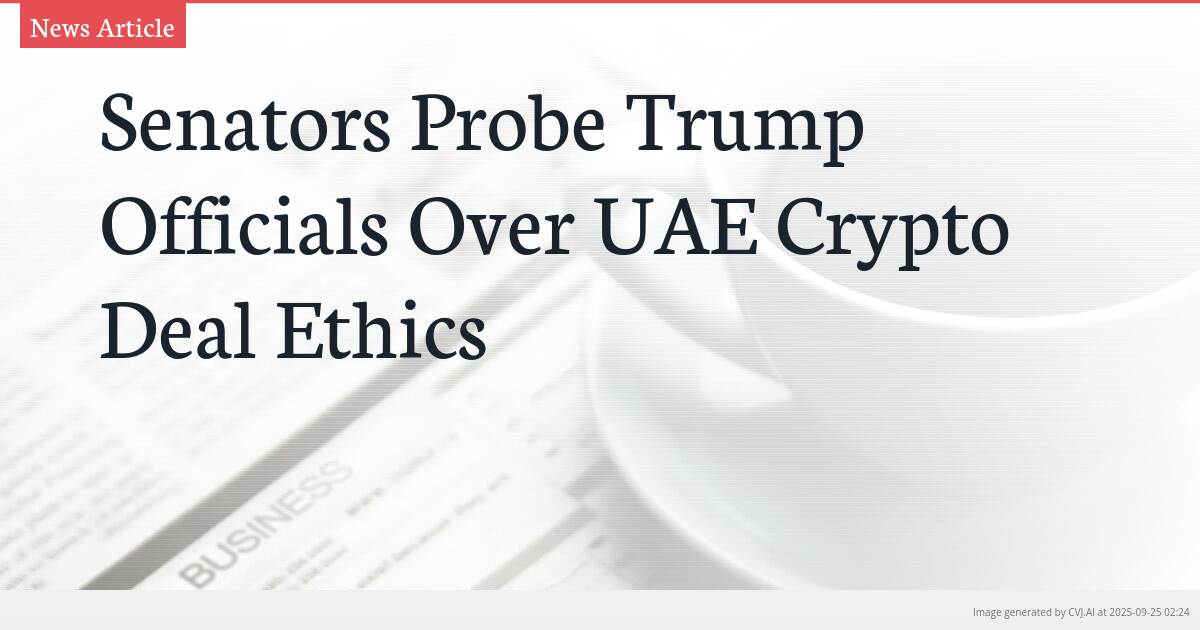This summary text is fully AI-generated and may therefore contain errors or be incomplete.
Introduction
Democratic Senators Elizabeth Warren and Elissa Slotkin are demanding investigations into potential ethics violations by Trump administration officials regarding a $2 billion UAE investment in World Liberty Financial. The probe centers on interconnected deals involving AI chip exports and the Trump family’s cryptocurrency venture. The senators allege the transactions created troubling conflicts of interest and national security concerns.
Key Points
- The investigation targets adviser Steve Witkoff, who worked at State Department before moving to White House and whose family benefited from the $2 billion UAE crypto investment
- White House AI czar David Sacks participated in chip export discussions despite colleagues' concerns about his crypto holdings creating conflicts of interest
- The Trump family controls 75% of World Liberty Financial's token sale revenues and has already profited $57 million while reducing their stake by 20%
The Interconnected Deals Under Scrutiny
The investigation call, detailed in a September 23 letter, targets two interconnected transactions announced in May. The first involved a U.S. plan to allow the United Arab Emirates to import American-designed artificial intelligence computer chips. Simultaneously, a government-backed Emirati firm invested $2 billion in World Liberty Financial (WLFI), a cryptocurrency company created by the Trump family and relatives of Trump adviser Steve Witkoff. Senators Warren and Slotkin described the pattern of these transactions as “deeply troubling” in their letter to the acting inspectors general of the Commerce and State Departments.
The core of the ethical concern lies in the simultaneous advancement of a policy benefiting the UAE and a substantial financial investment flowing to a company with direct ties to the President’s family and a senior adviser. While the report found no evidence of explicit quid pro quo agreements, it revealed that the deals intersected in previously unknown ways, raising significant questions about the integrity of the administrative process.
Key Figures and Conflict of Interest Allegations
The probe specifically targets Steve Witkoff, a Trump adviser who worked as a State Department employee for six months before transferring to a White House position. According to the senators’ letter, Witkoff advocated for the export of advanced AI chips to the UAE. At the same time, his family’s company secured the massive $2 billion crypto investment. This sequence of events forms the basis of the conflict of interest allegations.
Further complicating the matter is the involvement of David Sacks, the White House’s “AI and crypto czar.” The letter raises concerns that Sacks participated in discussions regarding the chip exports despite colleagues’ concerns about potential conflicts of interest related to his own crypto holdings. This new investigation builds upon a September 17 letter sent by Warren and seven other Democratic lawmakers to Sacks, pressing him on whether he exceeded the time window of his temporary appointment.
The senators also highlighted national security concerns, noting that the UAE’s ties to China could potentially compromise the security of the sensitive AI technology. The investment in WLFI, therefore, is not just a financial matter but one with potential implications for American technological supremacy and security.
Ongoing Congressional Scrutiny and Financial Stakes
This probe represents the latest in a series of Democratic efforts to examine the Trump family’s crypto ventures. The financial stakes are substantial. The Trump family controls 75% of World Liberty Financial’s net token sale revenues and 60% of future business operations, a arrangement that could generate an estimated $400 million in fees. Despite reducing its stake in WLFI by 20%, the Trump family has reportedly already earned $57 million in profits from the venture.
Congressional scrutiny is not new. In April, Senator Warren and Representative Maxine Waters previously requested the Securities and Exchange Commission’s records on World Liberty Financial, seeking information about potential conflicts arising from the Trump family’s involvement in the decentralized finance (DeFi) project. Furthermore, in June, Democratic Congressman Adam Schiff introduced the COIN Act, legislation seeking to prohibit presidents and executive officials from issuing or promoting specific cryptocurrencies while in office.
The consistent theme from Democratic lawmakers is a concern that the lines between public policy and private enrichment have been blurred. The call for inspectors general to investigate is a formal step to determine whether administration officials violated ethics rules in transactions that allegedly enriched the President’s family while simultaneously advancing a foreign policy initiative with a key ally.
📎 Read the original article on cryptoslate.com

